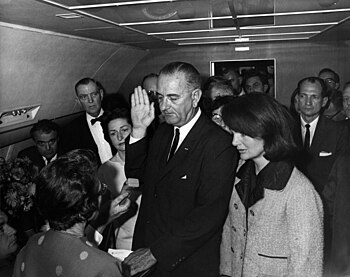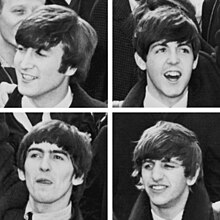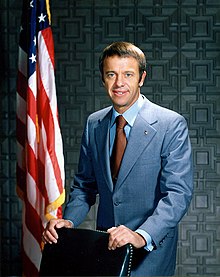Portal:1960s
The 1960s Portal
The 1960s became synonymous with the new, radical, and subversive events and trends of the period. In Africa the 1960s was a period of radical political change as 32 countries gained independence from their European colonial rulers. Some commentators have seen in this era a classical Jungian nightmare cycle, where a rigid culture, unable to contain the demands for greater individual freedom, broke free of the social constraints of the previous age through extreme deviation from the norm. Christopher Booker charts the rise, success, fall/nightmare and explosion in the London scene of the 1960s. However, this alone does not explain the mass nature of the phenomenon. Several nations such as the U.S., France, Germany and Britain turned to the left in the early and mid 1960s. In the United States, John F. Kennedy, a Keynesian and staunch anti-communist, pushed for social reforms. His assassination in 1963 was a stunning shock. Liberal reforms were finally passed under Lyndon B. Johnson including civil rights for African Americans and healthcare for the elderly and the poor. Despite his large-scale Great Society programs, Johnson was increasingly reviled by the New Left at home and abroad. The heavy-handed American role in the Vietnam War outraged student protestors across the globe, as they found peasant rebellion typified by Ho Chi Minh and Che Guevara more appealing. Italy formed its first left-of-center government in March 1962 with a coalition of Christian Democrats, Social Democrats, and moderate Republicans. Socialists joined the ruling block in December 1963. In Britain, the Labour Party gained power in 1964. In Brazil, João Goulart became president after Jânio Quadros resigned. This is a Featured article, which represents some of the best content on English Wikipedia.. The Beatles were an English rock band formed in Liverpool in 1960. The core lineup of the band comprised John Lennon, Paul McCartney, George Harrison and Ringo Starr. They are widely regarded as the most influential band in Western popular music and were integral to the development of 1960s counterculture and the recognition of popular music as an art form. Rooted in skiffle, beat and 1950s rock 'n' roll, their sound incorporated elements of classical music and traditional pop in innovative ways. The band also explored music styles ranging from folk and Indian music to psychedelia and hard rock. As pioneers in recording, songwriting and artistic presentation, the Beatles revolutionised many aspects of the music industry and were often publicised as leaders of the era's youth and sociocultural movements. Led by primary songwriters Lennon and McCartney, the Beatles evolved from Lennon's previous group, the Quarrymen, and built their reputation by playing clubs in Liverpool and Hamburg, Germany, starting in 1960, initially with Stuart Sutcliffe playing bass. The core trio of Lennon, McCartney and Harrison, together since 1958, went through a succession of drummers, including Pete Best, before inviting Starr to join them in 1962. Manager Brian Epstein moulded them into a professional act, and producer George Martin developed their recordings, greatly expanding their domestic success after they signed with EMI and achieved their first hit, "Love Me Do", in late 1962. As their popularity grew into the intense fan frenzy dubbed "Beatlemania", the band acquired the nickname "the Fab Four". Epstein, Martin or other members of the band's entourage were sometimes informally referred to as a "fifth Beatle". (Full article...) This is a Good article, an article that meets a core set of high editorial standards. Psychedelic rock is a rock music genre that is inspired, influenced, or representative of psychedelic culture, which is centered on perception-altering hallucinogenic drugs. The music incorporated new electronic sound effects and recording techniques, extended instrumental solos, and improvisation. Many psychedelic groups differ in style, and the label is often applied spuriously. Originating in the mid-1960s among British and American musicians, the sound of psychedelic rock invokes three core effects of LSD: depersonalization, dechronicization (the bending of time), and dynamization (when fixed, ordinary objects dissolve into moving, dancing structures), all of which detach the user from everyday reality. Musically, the effects may be represented via novelty studio tricks, electronic or non-Western instrumentation, disjunctive song structures, and extended instrumental segments. Some of the earlier 1960s psychedelic rock musicians were based in folk, jazz, and the blues, while others showcased an explicit Indian classical influence called "raga rock". In the 1960s, there existed two main variants of the genre: the more whimsical, surrealist British psychedelia and the harder American West Coast "acid rock". While "acid rock" is sometimes deployed interchangeably with the term "psychedelic rock", it also refers more specifically to the heavier, harder, and more extreme ends of the genre. (Full article...) Selected picture - Lyndon B. Johnson taking the U.S. Presidential Oath of Office on Air Force One following the assassination of John F. Kennedy in Dallas on November 22, 1963. He was sworn in by Judge Sarah T. Hughes, making him the first President sworn in by a woman. Johnson was not sworn using a Bible; none could be found aboard the plane. A Roman Catholic Missal was discovered in Kennedy's desk, and this book was used during the swearing-in ceremony. Did you know -
Related portalsThis is a Featured article, which represents some of the best content on English Wikipedia.. Alan Bartlett Shepard Jr. (November 18, 1923 – July 21, 1998) was an American astronaut. In 1961, he became the second person and the first American to travel into space and, in 1971, he became the fifth and oldest person to walk on the Moon, at age 47. A graduate of the United States Naval Academy at Annapolis, Shepard saw action with the surface navy during World War II. He became a naval aviator in 1947, and a test pilot in 1950. He was selected as one of the original NASA Mercury Seven astronauts in 1959, and in May 1961 he made the first crewed Project Mercury flight, Mercury-Redstone 3, in a spacecraft he named Freedom 7. His craft entered space, but was not capable of achieving orbit. He became the second person, and the first American, to travel into space. In the final stages of Project Mercury, Shepard was scheduled to pilot the Mercury-Atlas 10 (MA-10), which was planned as a three-day mission. He named Mercury Spacecraft 15B Freedom 7 II in honor of his first spacecraft, but the mission was canceled. (Full article...) This is a Good article, an article that meets a core set of high editorial standards. Ravi Shankar (Bengali pronunciation: [ˈrobi ˈʃɔŋkor]; born Robindro Shaunkor Chowdhury, sometimes spelled as Rabindra Shankar Chowdhury; 7 April 1920 – 11 December 2012) was an Indian sitarist and composer. A sitar virtuoso, he became the world's best-known expert of Indian classical music (in Sitar) in the second half of the 20th century, and influenced many musicians in India and throughout the world. Shankar was awarded India's highest civilian honour, the Bharat Ratna, in 1999. He is also the father of American singer Norah Jones and British-American musician and sitar player Anoushka Shankar. Shankar was born to a Bengali family in India, and spent his youth as a dancer touring India and Europe with the dance group of his brother Uday Shankar. At age 18, he gave up dancing to pursue a career in music, studying the sitar for seven years under court musician Allauddin Khan. After finishing his studies in 1944, Shankar worked as a composer, creating the music for the Apu Trilogy by Satyajit Ray, and was music director of All India Radio, New Delhi, from 1949 to 1956. He was nominated for the Academy Award for Best Original Score for scoring the blockbuster Gandhi (1982). (Full article...) Selected article -The Civil Rights Act of 1964 (Pub. L. 88–352, 78 Stat. 241, enacted July 2, 1964) is a landmark civil rights and labor law in the United States that outlaws discrimination based on race, color, religion, sex, and national origin. It prohibits unequal application of voter registration requirements, racial segregation in schools and public accommodations, and employment discrimination. The act remains one of the most significant legislative achievements in American history. Initially, powers given to enforce the act were weak, but these were supplemented during later years. Congress asserted its authority to legislate under several different parts of the United States Constitution, principally its enumerated power to regulate interstate commerce under the Commerce Clause of Article I, Section 8, its duty to guarantee all citizens equal protection of the laws under the 14th Amendment, and its duty to protect voting rights under the 15th Amendment. (Full article...) More Did you know (auto generated)
TopicsCategoriesWikiProjects
Associated WikimediaThe following Wikimedia Foundation sister projects provide more on this subject:
Discover Wikipedia using portals |





























